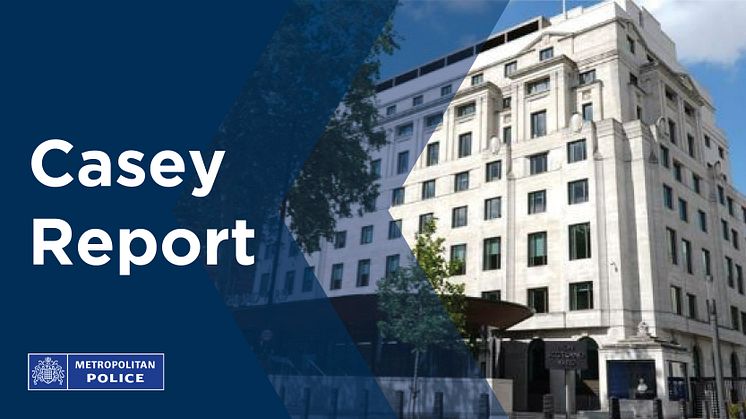
News -
Met calls for report into culture and standards to be catalyst for police reform
The Metropolitan Police has welcomed a report into its culture and standards and has called for it to be a catalyst for police reform.
The report follows an extensive review by Baroness Casey of Blackstock. Its findings, many of which are very critical of the Met, will be taken forward to inform and shape an ambitious plan to reform and rebuild trust while delivering for Londoners.
Commissioner Sir Mark Rowley said: “This report sparks feelings of shame and anger but it also increases our resolve.
“I am proud of those people, our officers and staff, whose passion for policing and determination to reform moved them to share their experiences with such honesty.
“This is, in many ways, their report. It must be a catalyst for police reform.
“This report needs to lead to meaningful change. If it only leads to pillory and blame of the exceptional majority of officers then only criminals will benefit.
“We need it to galvanise Londoners, the dedicated police majority and politicians to coalesce around reform and the renewal of policing by consent for the 21st century.”
The review was commissioned by the Met in October 2021 following the appalling murder of Sarah Everard by a serving officer and its publication follows other catastrophic and criminal incidents involving other officers.
Baroness Casey was asked to examine the standards of behaviour and internal culture of the Met and to make recommendations on the actions required.
Her final report, published today (Tuesday, 21 March), explores a wide range of issues including the Met’s organisation, its support for officers and staff, discrimination, standards, its approach to protecting women and children and its wider operational effectiveness.
Sir Mark added: “The appalling examples in this report of discrimination, the letting down of communities and victims, and the strain faced by the frontline, are unacceptable.
“We have let people down and I repeat the apology I gave in my first weeks to Londoners and our own people in the Met. I am sorry.
“I want us to be anti-racist, anti-misogynist and anti-homophobic. In fact, I want us to be anti-discrimination of all kinds.
“There are external factors – funding, governance, growing demand and resource pressures that shouldn’t sit with policing – that the report has identified. Baroness Casey is right to identify the impact these have had on our ability to police London, but there can be no excuses for us.
“The core of the problems are for policing to determinedly confront.”
The Met’s Turnaround Plan was intentionally published in draft form in January.
It marked the start of a conversation and a programme of meaningful engagement with communities and partners with a revised and final version to be published in late Spring.
Baroness Casey’s report will play a crucial role in shaping those ongoing conversations and will ensure the final plan meets the scope and scale of the challenge we are confronted with.
Sir Mark said: “Our Turnaround Plan is already building momentum across the Met.
“I am reassured that a number of issues highlighted by Baroness Casey – our service to victims, rebuilding neighbourhood policing and how we protect the most vulnerable for example – are priorities we too had identified.
“Baroness Casey’s insights, alongside feedback from the public, will greatly influence the next version.
“We know that the challenges ahead of us are not simple, but we have tens of thousands of inspiring and hard-working officers and staff and we will be determined and relentless in taking them on.
“I am confident we will succeed.”
A copy of Sir Mark's letter to Baroness Casey is available online.

